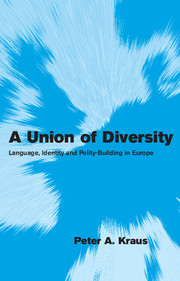Book contents
- Frontmatter
- Contents
- List of Tables and Figure
- Preface
- Acknowledgments
- A Union of Diversity
- 1 Introduction: The dynamics of European integration
- 2 The European Union's democratic deficit and the search for a European demos
- 3 The identity of a multinational polity
- 4 Language and politics: A challenge for Europe
- 5 The language question in the institutional complex of the European Union
- 6 Political communication in the transnational civil society
- 7 Recognition, self-determination and integration in a union of diversity
- References
- Index
- Titles in the series
7 - Recognition, self-determination and integration in a union of diversity
Published online by Cambridge University Press: 22 September 2009
- Frontmatter
- Contents
- List of Tables and Figure
- Preface
- Acknowledgments
- A Union of Diversity
- 1 Introduction: The dynamics of European integration
- 2 The European Union's democratic deficit and the search for a European demos
- 3 The identity of a multinational polity
- 4 Language and politics: A challenge for Europe
- 5 The language question in the institutional complex of the European Union
- 6 Political communication in the transnational civil society
- 7 Recognition, self-determination and integration in a union of diversity
- References
- Index
- Titles in the series
Summary
The line of argument developed in the previous chapters sought to demonstrate the central importance of the language question for the construction of a legitimate political order in Europe. In the course of the development of modern European democracies, language emerged as a crucial link between the cultural and political identities of citizens. Nowhere in Europe does membership in linguistic groups reflect a ‘primordial’ natural condition; it is rather the result of politics and of complex processes of social institutionalization. As an expression of cultural diversity, the phenomenon of European multilingualism must be accorded huge political importance in addition to its linguistic and anthropological significance. Hence, linguistic differentiation is a striking feature of political culture in the European Union (EU) and consequently also deserves close attention in debates over the future of integration. No European constitutional project can be successfully politically anchored without integrating into its normative architecture the socio-cultural resources on which a transnational order must be founded.
A key aspect of the argument presented here is the warning against allowing the ‘inevitable’ instrumentalism of market integration to spill over into the domain of political culture. The identity of a European civil society must take account of the diversity of cultural patterns of identification that centrally shape the self-understanding of the various political communities discernable within the EU. This normative task can be deduced from the essential European treaty texts.
- Type
- Chapter
- Information
- A Union of DiversityLanguage, Identity and Polity-Building in Europe, pp. 180 - 198Publisher: Cambridge University PressPrint publication year: 2008



